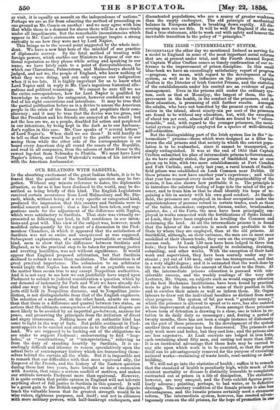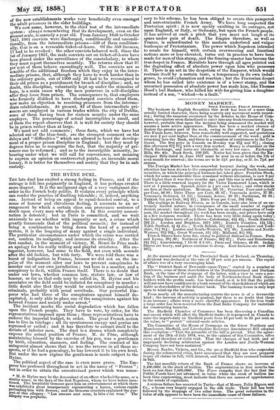THE IRISH "INTERMEDIATE" SYSTEM. leerDENTALLY the other day we mentioned
Ireland as serving for a. model to England in some of the most important social reforms that are at present under trial, and the Fourth Annual Report of Captain Walter Crofton comes as timely confirmation of our re- ference to the improvement of prison discipline. In this small blue-book we have an exceedingly satisfactory report of program) —progress, we mean, with regard to the 'development of the system, as well as to its influence on the prisoners. Captain Crofton is the Director of Irish Convict Prisons, and the statistics of the establishments under his control are an evidence of good management. Even in the prisons still under the ordinary sys.. tern, such as that at Mountjoy, the largest of them, the im- provement in the health, in the conduct of the prisoners, and in their education, is promising of still further results. Amongst the adults, who have not benefited by the present system of edu- cation in the island, about ninety-six per cent of the prisoners are found to be without any education, but, with the exception of about ten per cent, almost all of them are found to be " educe- tionable," and, with regard to the younger prisoners, the moni- torial system is profitably employed for a species of well-directed self-education.
But the distinguishing part of the Irish system lies in the " in- termediate " prisons—those which were designed as a filter be- tween the old prisons and that society in which the convict popu- lation is to be reabsorbed, since it cannot be transported, or simply extinguished. It was at the end of 1855 that Captain Crofton submitted his plan of intermediate prisons to Government. As we have already stated, the prison of Smithfield was at once given up to him, with two more establishments at Fort Camden and Fort Carlisle and, early last year, a rural branch of Smith- field prison was established on Lusk &mmon near Dublin. Of these prisons we now have another year's experience ; and while that year has removed every doubt as to the practicability of the system, it has also shown how profitable it is. The principle is to introduce the salutary feeling. of hope into the mind of the pri- soner, and to train him so that he shall identify his hope of re- gaining a life in society with his own good conduct. At Smith- field, the prisoners are employed in in-door occupation under the superintendence of persons versed in certain trades, such as those of the tailor, shoemaker, carpenter, tinman nailer, brushmaker, painter, &c. ; at the Forts, the men have inen principally em- ployed in works connected with the fortifications of Spike Island ; at Lusk, they have been employed in levelling the Common and reelairaing,the land. At all the intermediate prisons it is found that the labour of the convicts is much more profitable to the State by whom they are employed, than at the old prisons. At
i Smithfield, although, on their entrance, the men are n most cases unskilled at their chosen trade, they earn on the average 25/. per annum each. At Lusk 150 men have been lodged in three iron huts ; they have been employed mostly in reclaiming, draining, subsoiling, and other works. With the exception of their hard work and supervision, they have been scarcely under any re- straint; yet out of 150 men, only one has transgressed, and that in a very slight degree ; and it is estimated that the work done by the men is worth double the amount of their cost to the State. At all the intermediate prisons education is pursued with con- siderable success, and the weekly readings of the very able Lecturer, Mr. Organ, on subjects such as would engage attention at the best Mechanics Institutions, have been found by practical tests to give the inmates a better sense of their position in life, and to awaken their minds as well as inform them. Mr. Organ labours to draw out the individual faculties as distinct from mere class progress. The system of 6d. per week "gratuity money," which the prisoner is allowed to spend or to save, has also assisted in this improvement of character. From amongst those prisoners whose term of detention is drawing to a close, one is taken in ro- tation to do daily duty as messenger ; and, during a period of twenty months, there has not been a single instance of dishonesty on the part of those prisoners. In the development of the system another item of economy has been discovered. The prisoners not only work more and better, but theycost less ; and the prisons also are less expensive. At Lusk convicts are lodged in iron huts, each containing about fifty men and costing not more than 3301. It is an incidental advantage that these huts may be carried to any site upon which work is to be executed, so that the prison itself can be advantageously removed for the purpose of executing national works—reclaiming of waste lands, road-making or dock- building.
We will not go into the statistics of health ; suffice it to remark that the standard of health is peculiarly high, while much of the distent mortality or disease is distinctly traceable to complaints contracted out of prison in a life of dissipation. The statistics, however, are very unequal, and the Forts exhibit figures pecu- liarly adverse ; pointing, perhaps, to bad water, or to defective drainage. The sanitary condition of the female prisons is also less advantageous, and the lunatic prisons certainly need a strenuous reform. The intermediate system, however, has reacted advan- tageouely even on the old prisons, for the hope of promotion in OM
of the new establiahments works very beneficially even amongst the adult prisoners in the older buildings.
We now come, however, to the chief test of the intermediate system ; always remembering that its development, even on the present scale, is scarcely a year old. From January 1856 to October 1857, 1061 convicts were discharged, conditionally and uncondi- tionally, from the intermediate prisons-559 of them condition- ally., that is on a revocable ticket-of-leave. Of the 559 licences, 17 had to be revoked ; the other convicts behaved well. Since the 1st of January 1857, the male convicts out on ticket-of-leave have been placed under the surveillance of the constabulary, to whom they must report themselves monthly. The returns show that 97 per cent of them behave exceedingly well. The convicts are so sensible of the additional freedom which they enjoy in the inter- mediate prisons, that, although they have to work harder than in the ordinary gaols, out of 1300 only 26 had to be reconsigned to their old prison as a punishment for breach of discipline ; and, no doubt, this discipline, voluntarily kept up under the stimulus of hope, is a main cause why the men persevere in self-discipline after they issue from prison. The consequence is, that employers who formerly disliked to have discharged convicts about them, now make no objection to receiving prisoners from the interme- diate establishments. At present, 42 of those intermediate pri- soners are employed in various trades within the city of Dublin, some of them having been for sixteen months under the same employer. The percentage of actual incorrigibles is small, and of them the report observes that it is well for society they should be in prison rather than at large.
We need not add comments ; these facts, which we have but selected out of the blue-book, are the strongest comment on the delays and " difficulties " which are allowed to beset the develop- ment of a proper prison discipline in England ; but they must by degrees force us to recognize the fact, that the majority of pri- soners can be reformed ; and as to the incorrigible minority, la- bouring under what we will call for convenience, not meaning to express an opinion on controverted points, an incurable moral lunacy, it is better for themselves and society that they be in safe custody.



























 Previous page
Previous page